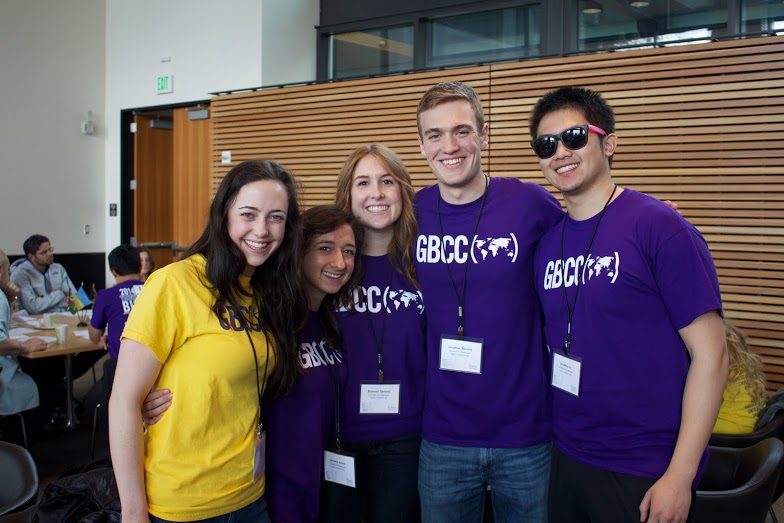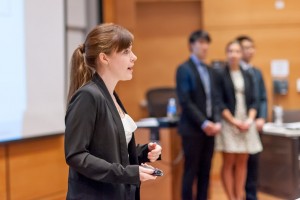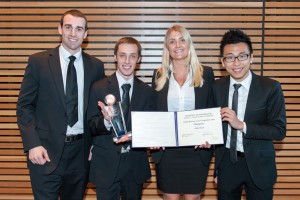Global Business Case Competition exports inspiration around the world
 Every year the Foster School’s Global Business Case Competition (GBCC) welcomes the world.
Every year the Foster School’s Global Business Case Competition (GBCC) welcomes the world.
Bangladesh and Brazil. Egypt and Estonia. Israel and Italy. Jamaica and Japan. Korea and Kuwait. Pakistan and Peru. Serbia and Singapore. Uganda and the United Kingdom. In all, 52 nations have sent their best and brightest undergraduate business students to match wits in the GBCC since its 1999 launch.
Now this long-time importer of competitors is exporting inspiration.
Kindred competitions in Portugal, New Zealand, Belgium, Sudan and Colombia have been inspired by unforgettable GBCC experiences and informed by its best practices.
 After Brendon Potter, student development and engagement manager at the University of Auckland Business School, brought a team to Seattle for its first international experience in 2004, he was moved to launch his school’s own champions league of case competitions. “Because of that invitation to the GBCC, we have established a significant case program of our own,” says Potter. “And it was the motivation to instigate our own Champions Trophy Case Competition in 2008, to which we’ve been delighted to welcome the Huskies on several occasions.”
After Brendon Potter, student development and engagement manager at the University of Auckland Business School, brought a team to Seattle for its first international experience in 2004, he was moved to launch his school’s own champions league of case competitions. “Because of that invitation to the GBCC, we have established a significant case program of our own,” says Potter. “And it was the motivation to instigate our own Champions Trophy Case Competition in 2008, to which we’ve been delighted to welcome the Huskies on several occasions.”
Some 12,000 miles and a hemisphere away in Portugal, Renata Blanc de Melo had a similar response when she brought a team of students from the Universidade do Porto to the 2007 GBCC. The lecturer and senior consultant began drawing up plans to replicate the competitive and cultural experience and in 2013 launched the FEP–UPORTO International Case Competition. “There is no case competition culture in Portugal, so being invited the first time was a departing point for us,” says Blanc. “And regarding our own competition, GBCC was undoubtedly a benchmark.”
This year, two former Foster students are instigating GBCC-style competitions to serve students in their respective corners of the world. Aysa Miller (BA 2004) and Nathan Bright (BA 2014) are both alumni of the Certificate of International Studies in Business (CISB), Foster’s nationally-ranked specialty program that gives undergrads a competitive edge in global business through language immersion, study or work abroad, and practical experience.
Miller, the economic and deputy commercial officer at the US Embassy in Khartoum, Sudan, has assembled a team of students representing three Sudanese universities to compete at this year’s GBCC. He’ll follow up with a local case competition hosted by the Ahfad University for Women—the first in the east African nation.
Bright, a teacher of international business, technology management and marketing at the Universidad de Manizales in Colombia, decided that a GBCC-style competition would benefit his students. To pull it off, he’s been working with Kathleen Hatch, assistant director of undergraduate programs at the Global Business Center.
 Hatch offers open source guidance to Bright, Miller and any others seeking to replicate the life-changing experience that the GBCC annually delivers through its heady mix of company visits, social events, professional development, cultural exchange and rigorous competition to solve a real-world international business challenge.
Hatch offers open source guidance to Bright, Miller and any others seeking to replicate the life-changing experience that the GBCC annually delivers through its heady mix of company visits, social events, professional development, cultural exchange and rigorous competition to solve a real-world international business challenge.
She’s not surprised to see the competition’s effect rippling so far and wide.
“I think that GBCC has been an inspirational model to other business schools because it incorporates everything that is so critical to business education today—cross cultural communications, team work, and strategic thinking,” says Hatch. “It forces students to grapple with the complexities of doing business in today’s global landscape.”
Not to mention, it’s great fun.
This year’s Global Business Case Competition takes place April 13-18.
